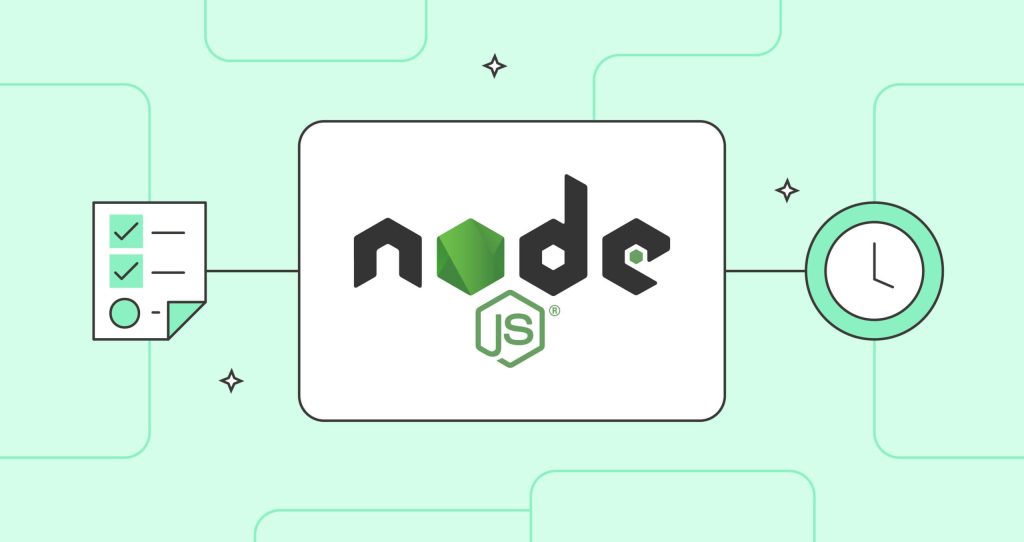Node.js is an open-source, cross-platform runtime environment that allows developers to run JavaScript code outside of a web browser. It was built on Google Chrome’s V8 JavaScript engine, which makes it fast and efficient for running server-side code.
Table of Contents
Working of Node.js
Node.js accepts the request from the clients and sends the response, while working with the request node.js handles them with a single thread. To operate I/O operations or requests node.js use the concept of threads. Thread is a sequence of instructions that the hosting server needs to perform. It runs parallel on the server to provide the information to multiple clients. Node.js is an event loop single-threaded language. It can handle concurrent requests with a single thread without blocking it for one request.

Key Features of Node.js:
- Non-blocking, event-driven architecture:
- Node.js uses an event-driven, asynchronous architecture. This means operations like I/O (reading/writing files, database queries) don’t block the execution of other code. Instead, they use callback functions or promises that are invoked once the operation is completed.
- Single-threaded with event looping:
- Despite being single-threaded, Node.js uses an event loop to handle many connections simultaneously. The event loop allows the server to process multiple requests without creating a new thread for each request, which makes it highly scalable and memory-efficient.
- Built for I/O-heavy applications:
- Node.js is ideal for building real-time applications, like chat apps, APIs, and streaming services, where quick handling of numerous I/O operations is required.
- NPM (Node Package Manager):
- Node.js has a built-in package manager called NPM, which provides access to a vast ecosystem of libraries and tools, making development faster and easier.
How Node.js Works
- V8 Engine: The heart of Node.js is the V8 engine (used in Google Chrome), which compiles JavaScript into machine code. This makes JavaScript run very fast in server environments, similar to how it runs in the browser.
- Event Loop:
- The event loop in Node.js continuously monitors for events (such as HTTP requests, file reads, etc.). When an event occurs, Node.js triggers the appropriate callback function or async code, rather than waiting for each operation to complete.
- Unlike traditional models that spawn multiple threads to handle concurrent tasks, Node.js handles them on a single thread with the event loop.
- Asynchronous I/O:
- Node.js’s architecture is built around non-blocking, asynchronous I/O operations. For example, reading a file from disk doesn’t stop the entire program; instead, the I/O request is sent, and once the file is read, a callback is executed.
- Modules:
- Node.js uses a module system (CommonJS) that allows you to include different packages and libraries. Developers can import core Node.js modules (like
fsfor file system access,httpfor creating servers) or external ones from NPM.
- Node.js uses a module system (CommonJS) that allows you to include different packages and libraries. Developers can import core Node.js modules (like

Example Workflow:
- HTTP Request: When a request comes to a Node.js server, it is placed in an event queue.
- Event Loop: The event loop checks the queue and processes the request (e.g., retrieving data from a database).
- Callback Execution: Once the I/O operation completes, the appropriate callback function is executed, which could involve sending a response back to the client.
Use Cases:
- Real-time applications like chat apps, collaboration tools, and live tracking services.
- RESTful APIs that need to handle multiple requests concurrently.
- Streaming applications like media servers, video streaming platforms, etc.
- Single-page applications (SPAs) that benefit from non-blocking I/O operations.
In short, Node.js is efficient for applications that require high concurrency and I/O operations but are not CPU-bound.
Conclusion
Node.js is a powerful runtime environment that enables developers to use JavaScript for building fast, scalable, and efficient server-side applications. Its non-blocking, event-driven architecture makes it ideal for handling I/O-heavy tasks and real-time applications. With its wide ecosystem supported by NPM and its ability to handle concurrent operations on a single thread, Node.js has become a popular choice for modern web development, powering everything from APIs to real-time communication services.





